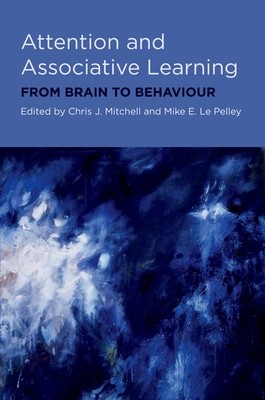
- Mēs nosūtīsim 10-14 darba dienu laikā.
- Autors: Chris Mitchell
- Izdevējs Oxford University Press, USA
- ISBN-10 : 0199550530
- ISBN-13 : 9780199550531
- Formāts: 15.8 x 23.6 x 3.1 cm, kieti viršeliai
- Valoda: Anglų
- Extra -10% atlaide, ievadot kodu: EXTRA
Atsauksmes
Apraksts
Attention and learning are two of the most important topics in contemporary cognitive psychology and behavioural neuroscience. Of even more interest is how the two interact. Meaningful stimuli and their meaningful effects are invariably embedded in a complex background of meaningless information. Yet, in order to learn about meaningful relationships between events, an organism needs to be able to extract the relevant from the irrelevant. The ability to direct attention selectively to some stimuli and away from others is one fundamental mechanism by which this filtering of information can occur. But what controls this selective attention? Why are certain stimuli selected and others rejected? What are the neural mechanisms underlying this ability? Are they the same in humans as in other animals? And what are the consequences of damage to this attentional system? These are the questions that this book aims to answer. The idea of an interaction between attention and learning has experienced a huge surge of interest in recent years. Advances in behavioural neuroscience have made it possible to investigate the neural basis of attention mechanisms; advances in connectionist modelling techniques have allowed us to implement and test more complex computational models of the operation of these mechanisms; and recent studies have implicated impairments in the ability to deploy selective attention appropriately in disorders such as schizophrenia and Parkinson's Disease. This book brings together leading international learning and attention researchers to provide both a comprehensive and wide-ranging overview of the current state of knowledge of this area as well as new perspectives and directions for the future. There are coherent themes that run throughout the book, but there are also, inevitably, fundamental disagreements between contributors on the role of attention in learning. Together, the views expressed in this book paint a picture of a vibrant and exciting area of psychological research, and will be essential reading for researchers of learning and attention.10 EXTRA % atlaide
Kupona kods: EXTRA
Akcija beidzas 7d.06:44:14
Atlaides kods derīgs pirkumiem no 10 €. Atlaides nav kumulatīvas.
Derīgs tikai pirkumiem tiešsaistē.

- Autors: Chris Mitchell
- Izdevējs Oxford University Press, USA
- ISBN-10: 0199550530
- ISBN-13: 9780199550531
- Formāts 15.8 x 23.6 x 3.1 cm, kieti viršeliai
- Valoda: Anglų

Atsauksmes